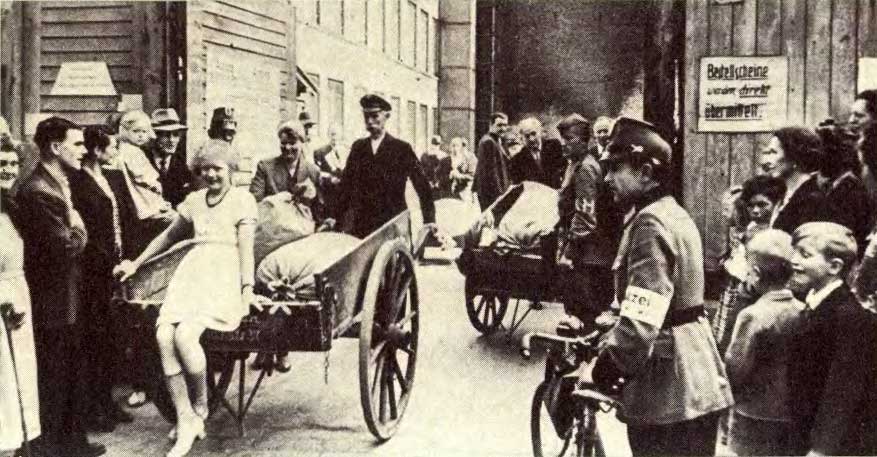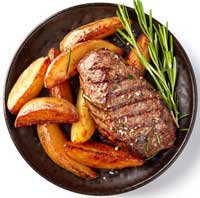Berlin 1945 - Awakening of Life
- 06 Nov 2024
- Политика, армия, война
- 381 Прочтений
- 0 Комментариев
Berlin in the Spring of 1945
from the memoirs THE MAIN DIRECTION
On May 9, 1945 at 0.45 Moscow time, a representative of the Hitler command signed in Berlin an act of complete and unconditional surrender of fascist Germany. How the Soviet command began to normalise life in this large, half-ruined, famished city is described in his memoirs by Lieutenant-General Nikolai ANTIPENKO
AWAKENING TO LIFE
As we neared Berlin, we seldom saw people ploughing the land or planting potatoes. The few we did see were isolated individuals tilling tiny plots of land. The greater part of the territory between the Oder and Berlin and even west of Berlin remained uncultivated. Apparently the Germans were not thinking of the future. Many of them believed they were doomed and feared they would have to pay for all the horrors the Reich had unleashed upon the peoples of the world, the Soviet Union above all.
A group headed by Walter Ulbricht arrived in Berlin. After familiarising itself with the situation, it asked the Soviet command for aid in rehabilitating the war-ravaged German national economy, in providing the population of German cities and villages with food, fuel and other necessities.
The Military Council considered the appeal with understanding and assigned me, as deputy front commander for logistics, to work out appropriate proposals. Eventually I reported that in the course of the Berlin operation the troops of our front had begun spring sowing. By May 5, 1945 the acreage under cultivation had reached 350,000 hectares. But this was very little. At least another five million hectares needed to be sown, which meant the population had to be drawn into the work.
I also called attention to the fact that many estates remained ownerless; some of them had been taken over by peasants who had appointed their own managers, but the rest lay abandoned. We had to put a stop to the grabbing of unworked land, mobilise whatever farm machinery had survived the war and organise repair work, halt the requisition of horses, and most important, help with seed, potatoes, tractors, fuel and transport.
The Military Council agreed with my proposals. The Germans were issued thousands of tons of potatoes, millet, peas and other crops, which could still be planted and sown. We also helped them with tractors, machines and fuel. At last all the farmlands were put under cultivation. Working in the fields, the Germans awakened from their lethargy and showed that, as before, they were calculating masters and industrious workers.
BERLINERS HURRY HOME
But while the organisation of sowing was a form of concern for the future, the organisation of immediate food supplies was a pressing problem of the present. The working people of Berlin had long been suffering from undernourishment. Toward the end of the war hundreds of thousands were starving. The bourgeoisie had fled but the workers remained, so the Soviet government showed concern for them even before the surrender of Germany. Once in Berlin, the Military Council of the front, pending relevant decisions of the State Defence Committee, introduced interim rations for the Berliners.
On May 9, 1945, Anastas Mikoyan, a deputy chairman of the USSR Council of Ministers, and General Andrei Khrulyov, chief of the Soviet Army rear, arrived in Berlin with a Soviet Government decision to organise aid to the population of the city.
According to the new ration schedule, people who did heavy physical work and those in jobs presenting a health hazard were given a top daily ration: 600 grammes of bread, 80 grammes of cereals and macaroni, 100 grammes of meat, 30 grammes of fats and 25 grammes of sugar. The ordinary worker's daily ration consisted of 500 grammes of bread, 60 grammes of cereals and macaroni, 65 grammes of meat, 15 grammes of fats and 20 grammes of sugar. The rest of the popfulation received 300 grammes of bread, 30 grammes of cereals and macaroni, 20 grammes of meat, 7 grammes of fats and 15 grammes of sugar. Besides, each inhabitant was entitled to 400-500 grammes of potatoes a day and 400 grammes of salt a month. Finally, by ration cards, coffee and tea were issued. Scientists, scholars, engineers, doctors, people in the cultural and arts fields, municipal and district self-government executives, heavy industry and transport officials, were given the top ration rates. Technical workers, businessmen, teachers and churchmen received the standard workers' ration. Hospital patients were given special rations. Besides, Mikoyan ordered that a daily 200 grammes of milk be issued to each Berlin child up to the age of 13.
On the basis of these rates we calculated the food deliveries. But here a difficulty cropped up. Berlin's registered population was a little over two million, so we had this number of food ration cards printed and made the corresponding supply order. Suddenly the situation changed. On hearing that the Soviet Military Command intended to feed the people of Berlin, long columns of men, women and children began to file to the capital from all parts of Germany. They came by bicycle, motor-cycle, broken-down motorcar, wagon, dogdrawn cart or simply walked. We had to raise the number of ration cards to four million.
NATURAL COFFEE
While we were busy with the organisation of food deliveries, Berlin was flooded with a host of provocative rumours. People even whispered that Germans would be gathered at the food distribution centres as part of an all-out round-up campaign. However, on the appointed day and hour (eight o'clock in the morning of May 15) all stalls opened and food began to be issued.
Not long before, Mikoyan was reading the text printed on the ration card. He looked up and asked me:
"What coffee are you going to give the Germans?"
"Ersatz," I replied.
"Why not natural?"
1 said that the front did not have natural coffee in its depots and that I myself had not drunk it for quite a long time.
"You haven't got it in your depots but the Soviet state has it," said Mikoyan. "Take the trouble to add the word 'natural' to coffee on each card."
We had to have this word printed additionally on four million cards.
While we were making this amendment a trainloads of real coffee beans left Moscow for Berlin. The railwaymen gave this train top priority.
IN A LITTLE OVER A MONTH
Before me is a report dated June 21, 1945 on what had been done to normalise the situation in Berlin. It says: "The required number of food ration cards has been issued for June. The network of shops and stores is sufficient. The children are being given milk regularly Food deliveries are on schedule.
"Extensive medical and epidemiological reconnaissance has been carried out and hotbeds of infection liquidated. More than 2,000 bodies of animals in the city have been collected and buried.
"Pumping stations have been inspected and polluted sources of water prohibited from use. Medical control has been established over refrigerators, sausage plants, canneries. Ninety-two adult hospitals, four children's hospitals, 10 maternity homes. 146 chemist's shops, nine outpatient hospitals, four dispensaries. 13 medical posts, three children's consultation centres and six first-aid stations have been opened. The overall number of hospital beds made available is 31,780; 654 doctors are working in medical treatment establishments and there are 801 private practitioners. The main health service administration and district health bodies have been set up in Berlin.
"The capacity of operating electric power stations has been brought to 98,000 kilowatts. Thirty-three thousand homes, 51 waterworks and sewerage stations, four bathhouses, seven laundries, 480 barber's and hairdresser's shops and 1,084 bakeries have been connected to the electrical network. More than 3,000 street lamps have been repaired and connected.
"15 pumping stations with a daily capacity of 510 thousand cubic metres have been put into operation and the principal water mains restored. Eighty- five thousand buildings and all welfare enterprises have been connected to the water supply system.
"35 sewerage stations have been opened.
"39.2 kilometres of metro lines are working, with 52 stations and 16 trains with a total of 62 cars.
"8 tramlines with a total length of 65.4 kilometres and 122 cars are functioning.
"7 omnibus lines with a total length of 91 kilometres and 46 buses have begun to function.
"5 gasworks with a total daily capacity of 157,000 cubic metres have been made operational.
"6 bathhouses are operating and 5 are under repair. 10 laundries are open.
"18 freight trains have been made available for coal deliveries from Silesia. Briquette coal from Munche- berg is being carried by 25 trains, 850 tons each.
"The functioning theatres are: The Western Theatre, with a ballet troupe performing, the Renaissance Theatre (comedy), the philharmonic symphony orchestra, opera and drama theatres will resume performances in the next few days, 45 variety theatres and 127 motion-picture houses are running, with a daily attendance of between 80 to 100 thousand ..
These lines make me think of the German Democratic Republic of our day, of the flowering it has achieved. As is known, the GDR is now among the world's 10 most developed countries, its industrial output equals that of all prewar Germany. The first socialist state in German history is firmly and confidently carving out its future.
***






Letzte Kommentare
Artikel
Fotos
Eigene Seiten